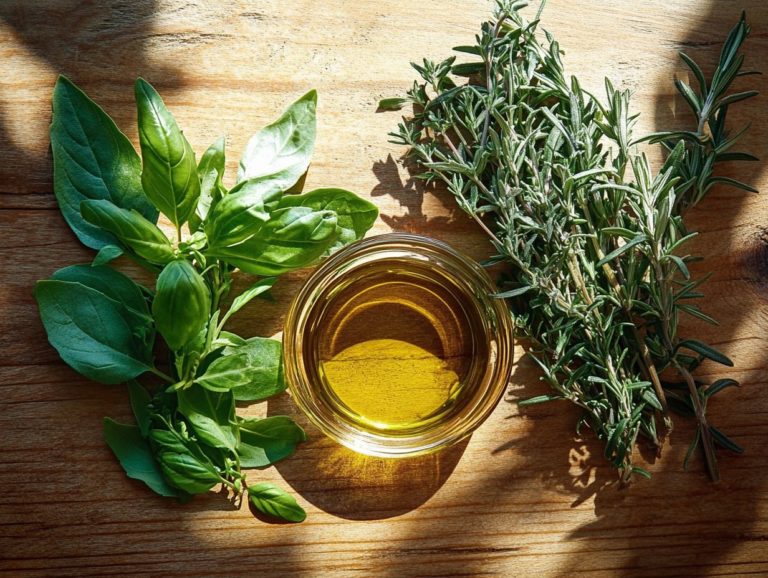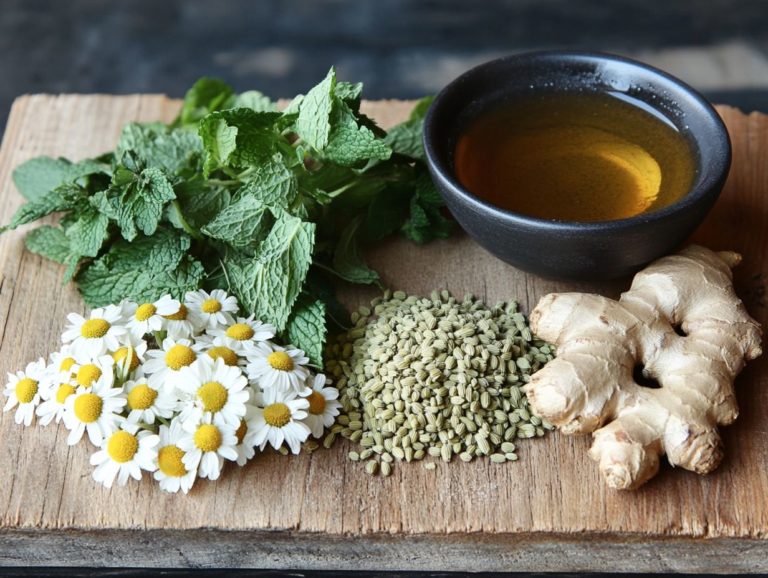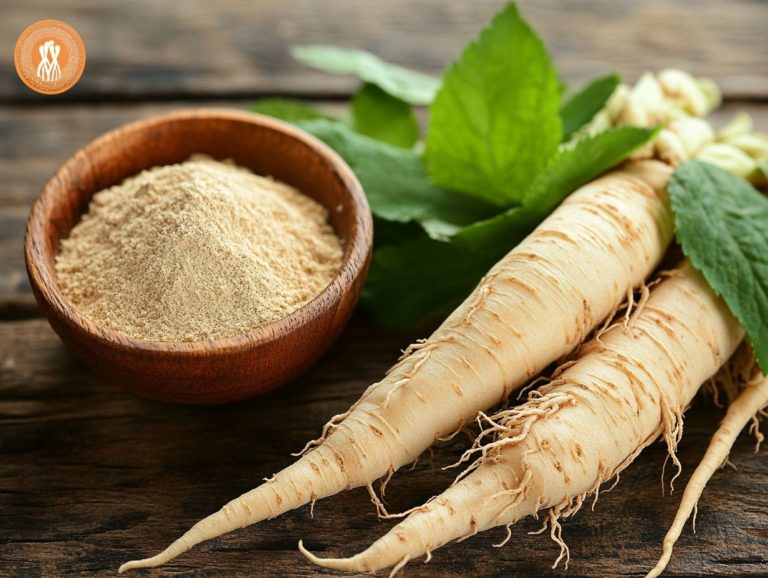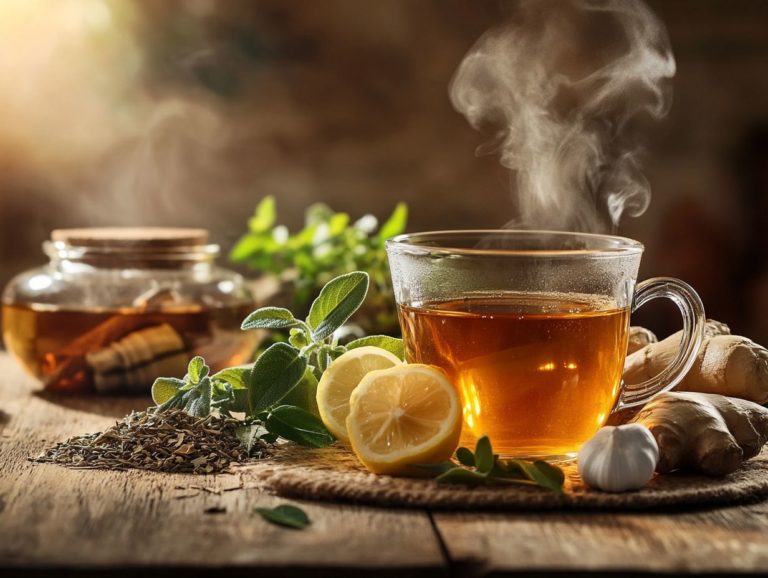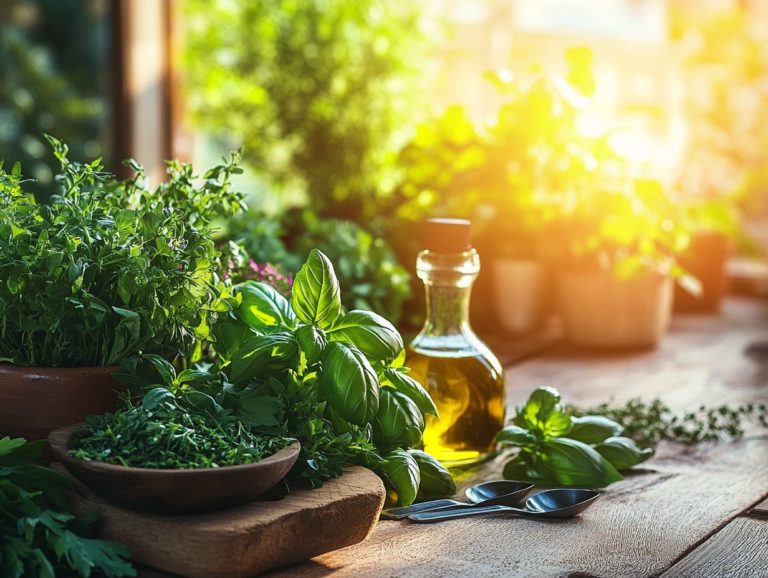Using Herbs in Natural Skincare
Incorporating herbs into your skincare routine not only elevates your beauty regimen but also harmonizes with a natural and sustainable lifestyle.
With their remarkable ability to soothe inflammation and enhance radiance, the potential skin benefits of herbs are truly extensive.
This guide assists you in selecting the right herbs tailored to your specific skin type. It also helps you seamlessly integrate them into your routine while considering essential safety precautions.
Unlock the secrets of nature s power and embrace the journey to healthier, glowing skin.
Contents
- Key Takeaways:
- Benefits of Using Herbs in Skincare
- Choosing the Right Herbs for Your Skin Type
- How to Incorporate Herbs into Your Skincare Routine
- Safety Precautions and Potential Allergies
- Patch Testing and Monitoring Reactions
- Frequently Asked Questions
- What are the benefits of using herbs in natural skincare?
- Can I use any type of herb in my natural skincare routine?
- How can I incorporate herbs into my natural skincare routine?
- Are there any precautions I should take when using herbs in natural skincare?
- Can I mix different herbs together in my skincare routine?
- Are there any herbs that are known to be particularly beneficial for the skin?
Key Takeaways:
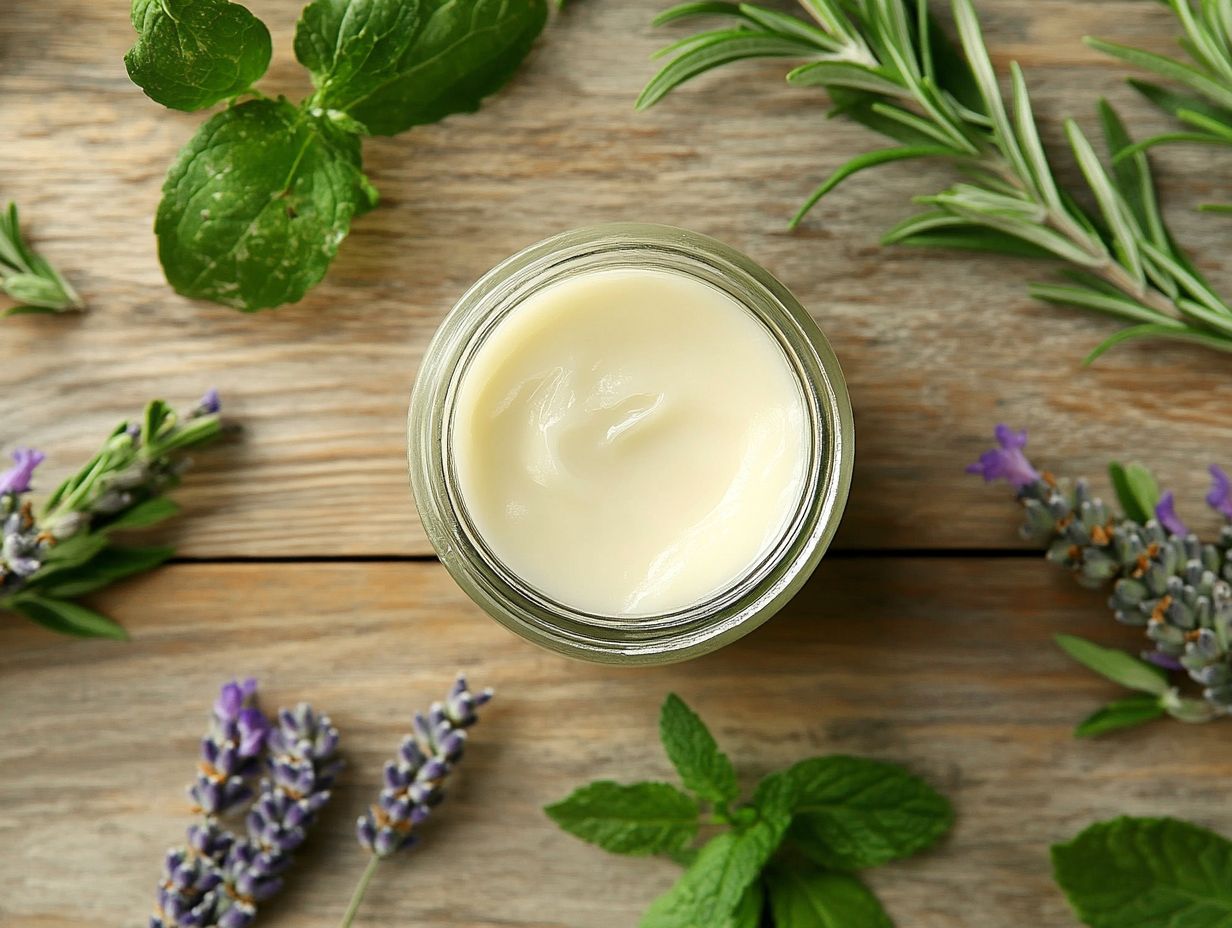
- Using herbs in skincare provides natural and sustainable options with potential benefits for your skin.
- Identifying your skin type and matching herbs to its specific needs is key in choosing the right herbs for your skincare routine.
- Incorporating herbs can be done through various methods and DIY products. However, it’s important to consult with a professional and patch test for potential allergies.
Benefits of Using Herbs in Skincare
Herbs offer numerous benefits for your skincare routine. Their natural therapeutic properties greatly enhance skin health and wellness.
By weaving herbal remedies and plant-based ingredients into your beauty regimen, you can tap into nature s healing powers. This helps tackle various skin conditions and elevate your self-care rituals.
Consider the rich properties of calendula, aloe vera, chamomile, and lavender. These herbs are brimming with nutrients that moisturize, soothe, and revitalize your skin.
These botanical gems also enhance your overall skincare experience, often found in essential oils and infused oils.
Natural and Sustainable Options
Choosing natural and sustainable skincare options is essential as you seek healthier alternatives to synthetic products that might harbor harmful chemicals.
By selecting organic ingredients like herbal extracts and essential oils, you align yourself with a commitment to wellness. You also support environmental sustainability through responsible sourcing and cultivation practices.
When you opt for these eco-friendly products, you nurture your skin and contribute to a greater cause protecting the planet.
Natural formulations are typically rich in vitamins and antioxidants. This enhances your skin’s health while minimizing the risk of irritation or adverse reactions.
Prioritizing skincare with organic ingredients means you actively reduce your carbon footprint. Choose organic ingredients today and make a real impact on your skin and the planet!
Potential Skin Benefits
Herbal remedies present a wealth of potential benefits for your skin, thanks to their remarkable anti-inflammatory and soothing properties.
They re perfect for tackling various skin conditions like acne, eczema, and the telltale signs of aging. By incorporating ingredients rich in therapeutic qualities think chamomile and lavender you re poised to experience the nourishing effects these botanical wonders can bring.
Take calendula extract, for example. Renowned for its healing prowess, it can significantly enhance skin hydration and soothe irritation, making it an exceptional choice for sensitive skin types.
Pairing green tea with aloe vera creates a powerful concoction that diminishes redness and addresses uneven skin tone, resulting in a brighter, more uniform complexion.
These herbal combinations aren’t just topical treatments; they actively promote overall skin health by fostering natural regeneration and delivering essential nutrients. This effectively bolsters your skin’s resilience against environmental stressors.
Choosing the Right Herbs for Your Skin Type
Selecting herbs that match your skin type is vital for optimizing your skincare routine. Each type oily, dry, sensitive, or combination has unique needs that targeted herbal extracts can fulfill.
If you have oily skin, witch hazel can help tighten your skin and reduce oil. For dry skin, nourishing oils like avocado or sweet almond provide essential hydration.
Identifying Your Skin Type
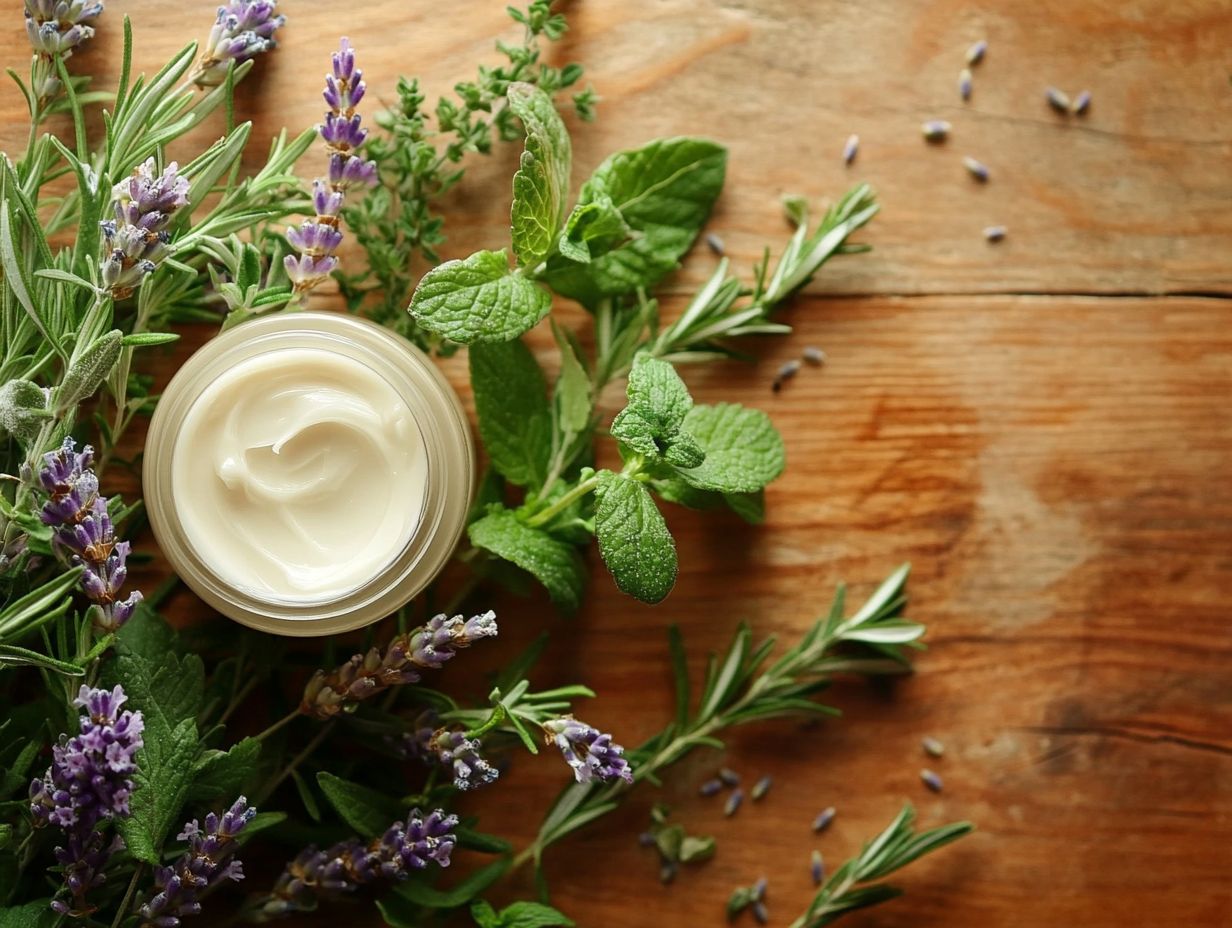
Knowing your skin type is crucial for choosing the best herbal skincare products. Common types include oily, dry, sensitive, and combination, each requiring specific care.
Oily skin might feel greasy and prone to breakouts. Dry skin tends to look flaky and feel tight, indicating a need for more moisture.
Sensitive skin can react to certain ingredients, showing redness or irritation. Combination skin displays signs of both oily and dry types, usually in the T-zone.
You can identify your skin type by using tests like the blotting sheet method or noticing how your skin feels after washing. Selecting the right herbal ingredients can enhance your skin’s health and vitality.
Matching Herbs to Your Skin’s Needs
After identifying your skin type, choose herbs that match its specific needs. For oily or acne-prone skin, tea tree and basil are excellent choices due to their natural antibacterial effects.
If you’re after anti-aging benefits, consider using comfrey and chamomile. For dry skin, marshmallow root and aloe vera provide soothing hydration.
Incorporating these herbs into your routine can be simple. You can create infusions or face masks by mixing dried herbs with water, yogurt, or honey.
Another effective method is steeping herbs in oil to make a nourishing balm. Mixing these with carrier oils enhances absorption and boosts your skin’s health and glow.
How to Incorporate Herbs into Your Skincare Routine
Adding herbs to your skincare routine can be rewarding, offering both therapeutic benefits and a personalized beauty approach.
Try methods like infusions, tinctures, or applying herbal oils directly to craft a regimen that enhances your skin health and utilizes the power of natural ingredients.
Methods of Application
You have a wealth of effective methods at your fingertips for applying herbs to your skin. These techniques allow you to harness their benefits and seamlessly weave them into your daily skincare routine.
Consider techniques such as herbal oils, infusions, and tinctures. These can be blended into creams and serums or used directly for targeted treatment.
Crafting herbal masks is another enjoyable way to use herbs. For example, blending dried herbs into a base of yogurt or honey creates a nourishing treatment that hydrates and soothes your skin beautifully.
Preparing a herbal steam can further enhance the absorption of beneficial compounds. Simply add your chosen herbs to boiling water, lean over with a towel, and let the steam work its magic on your face.
Layering applications can significantly amplify the effects. Following a herbal face wash with an infused toner and moisturizer enriches your regimen. This also allows you to tailor skincare benefits to your specific needs whether that’s calming irritated skin or boosting your natural radiance.
The possibilities are thrilling get creative and see what works best for you!
Creating DIY Skincare Products
Creating DIY skincare products gives you the power to customize herbal remedies to meet your unique skin needs. This ensures you use only the finest natural ingredients.
Imagine serums infused with chamomile or oils enriched with calendula. Your options for personalization are limitless, allowing you to design the perfect self-care experience.
By exploring the distinct properties of various herbs, you can make each product work better. For example, lavender offers soothing benefits for irritated skin, while rose hip oil is celebrated for its anti-aging qualities.
It’s crucial to source high-quality ingredients. Ideally, choose trusted suppliers or organic markets to guarantee that what you apply is free from harmful chemicals.
Always remember to perform a patch test before introducing new formulations. This simple step helps prevent negative skin reactions and ensures that the ingredients you choose harmonize beautifully with your skin type.
Safety Precautions and Potential Allergies
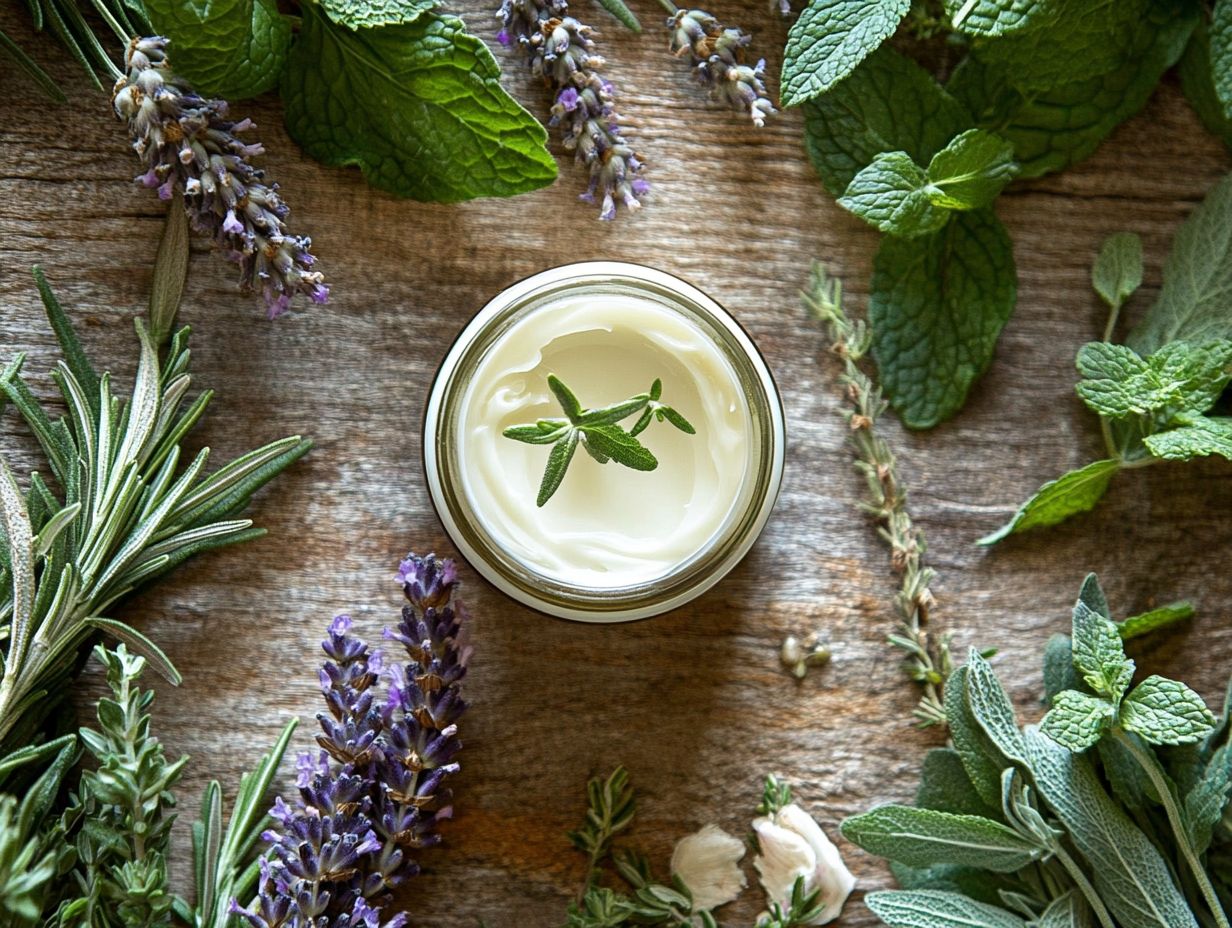
When you decide to incorporate herbs into your skincare routine, it s essential to prioritize safety precautions and be mindful of potential allergies. This ensures a truly positive experience.
By understanding your individual sensitivities and consulting with a skincare professional, you can effectively mitigate any risks associated with herbal remedies especially if you have sensitive skin.
Consulting with a Professional
Consulting with a professional, whether a dermatologist or an herbalist, is crucial when you’re considering incorporating herbal remedies into your skincare routine especially if you have pre-existing skin conditions or allergies.
Their expertise can offer you valuable insights into which herbs are both safe and effective for your specific skin type. Skilled practitioners can tailor their recommendations to address your unique skin concerns.
This paves the way for a more personalized approach to skincare. When searching for qualified specialists, look for those with reputable certifications and positive reviews.
Engaging in consultations gives you the power to know the best herbal ingredients to include in your regimen and those you should steer clear of. This ensures your skincare routine is not only effective but also safe.
Ultimately, this collaborative effort can lead to healthier, more radiant skin without the risk of negative skin reactions. Act now to discover the benefits of herbs for your skin!
Patch Testing and Monitoring Reactions
Patch testing is an essential step before you fully embrace any new herbal remedy in your skincare routine. It serves as your personal safeguard, helping you identify any potential allergic reactions or sensitivities.
By applying a small amount of the herbal product to a discreet area of your skin, you can safely gauge how your skin responds before making the commitment to regular use.
This process typically involves choosing a small, inconspicuous area like the inner forearm and applying a test patch of the product. Once applied, it s crucial to wait 24 to 48 hours to observe any possible reactions. These may manifest as redness, itching, or swelling.
During this waiting period, keeping a close eye on your skin for any changes is vital, as some reactions can be delayed. If you encounter no adverse signs, it’s likely that the product is safe for broader application. However, it s wise to remain vigilant and repeat the testing process whenever you introduce additional products.
By understanding how your skin responds over time, you can improve your skin’s health and prevent any unexpected irritations.
Frequently Asked Questions
What are the benefits of using herbs in natural skincare?
Using herbs in natural skincare can provide a variety of benefits for your skin. Herbs contain powerful antioxidants and anti-inflammatory properties that can help improve overall skin health, reduce signs of aging, and even treat specific skin conditions such as acne or eczema.
Can I use any type of herb in my natural skincare routine?
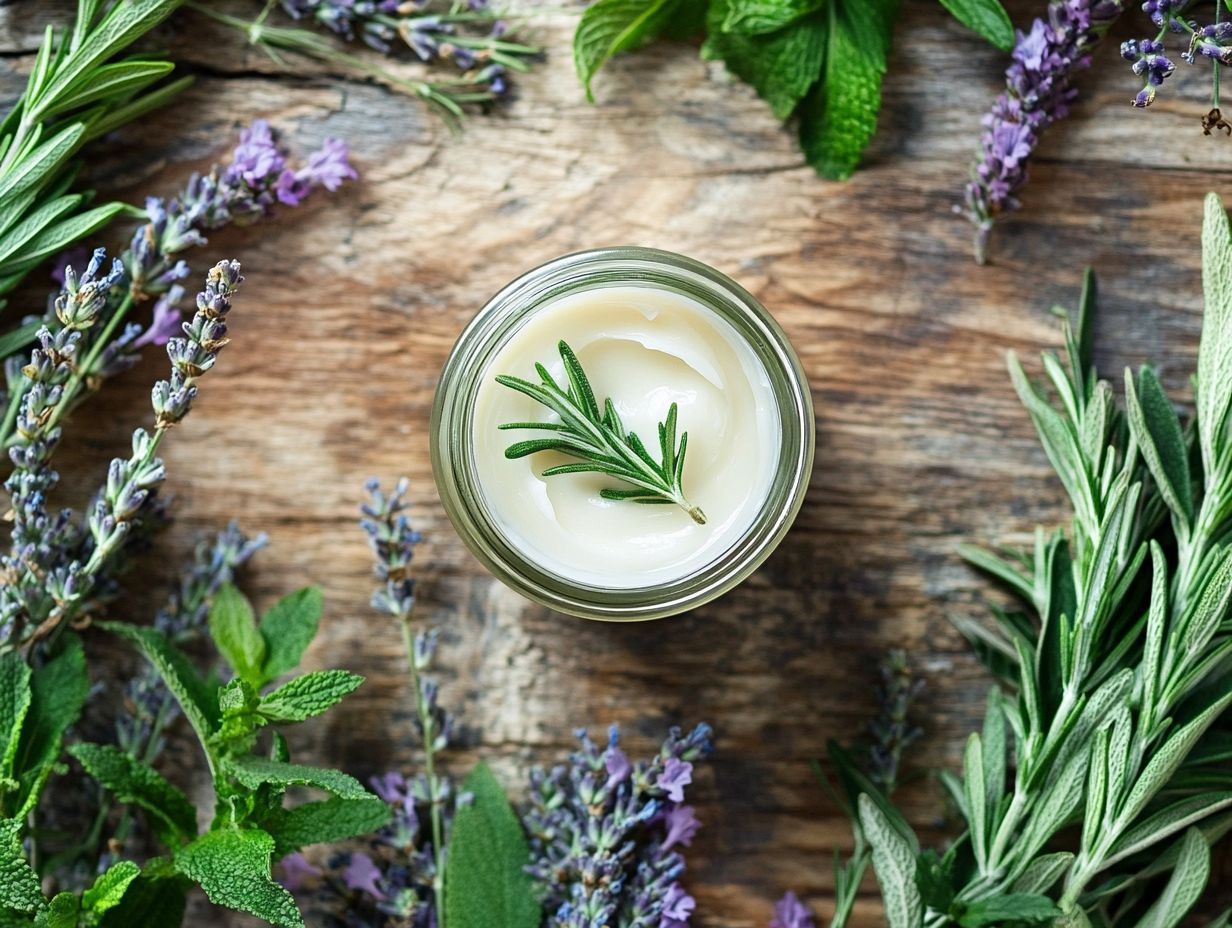
While there are many herbs that can be beneficial for the skin, it’s important to do your research and choose ones that are suitable for your skin type and concerns. Some herbs may be too harsh or irritating for certain skin types, so it’s best to consult with a skincare professional or do a patch test before incorporating a new herb into your routine.
How can I incorporate herbs into my natural skincare routine?
There are many ways to incorporate herbs into your natural skincare routine. You can create your own herbal infused oils or use dried herbs as a facial steam. You can also find skincare products that are specifically formulated with herbal ingredients.
You can also add fresh herbs to a DIY face mask or toner for extra benefits.
Are there any precautions I should take when using herbs in natural skincare?
Like with any skincare ingredient, it’s important to use herbs in moderation and do a patch test before applying them to your entire face. Some herbs may be too potent for certain skin types and could cause irritation.
Make sure to explore the herbs you want to use and properly research any herbs you plan on using. Consult with a healthcare professional if you have any allergies or sensitivities.
Can I mix different herbs together in my skincare routine?
Mixing different herbs together in your skincare routine can be a great way to customize your routine and target specific skin concerns. However, some herbs may not work well together or could have adverse reactions, so it’s important to research and choose compatible herbs before mixing them together.
Are there any herbs that are known to be particularly beneficial for the skin?
Yes, many herbs are known for their beneficial properties for the skin. Some popular ones include rosehip for anti-aging, chamomile for soothing and calming, and green tea for its antioxidant properties.
However, everyone’s skin is different, so it’s important to find the right herbs that work for your individual skin concerns.

